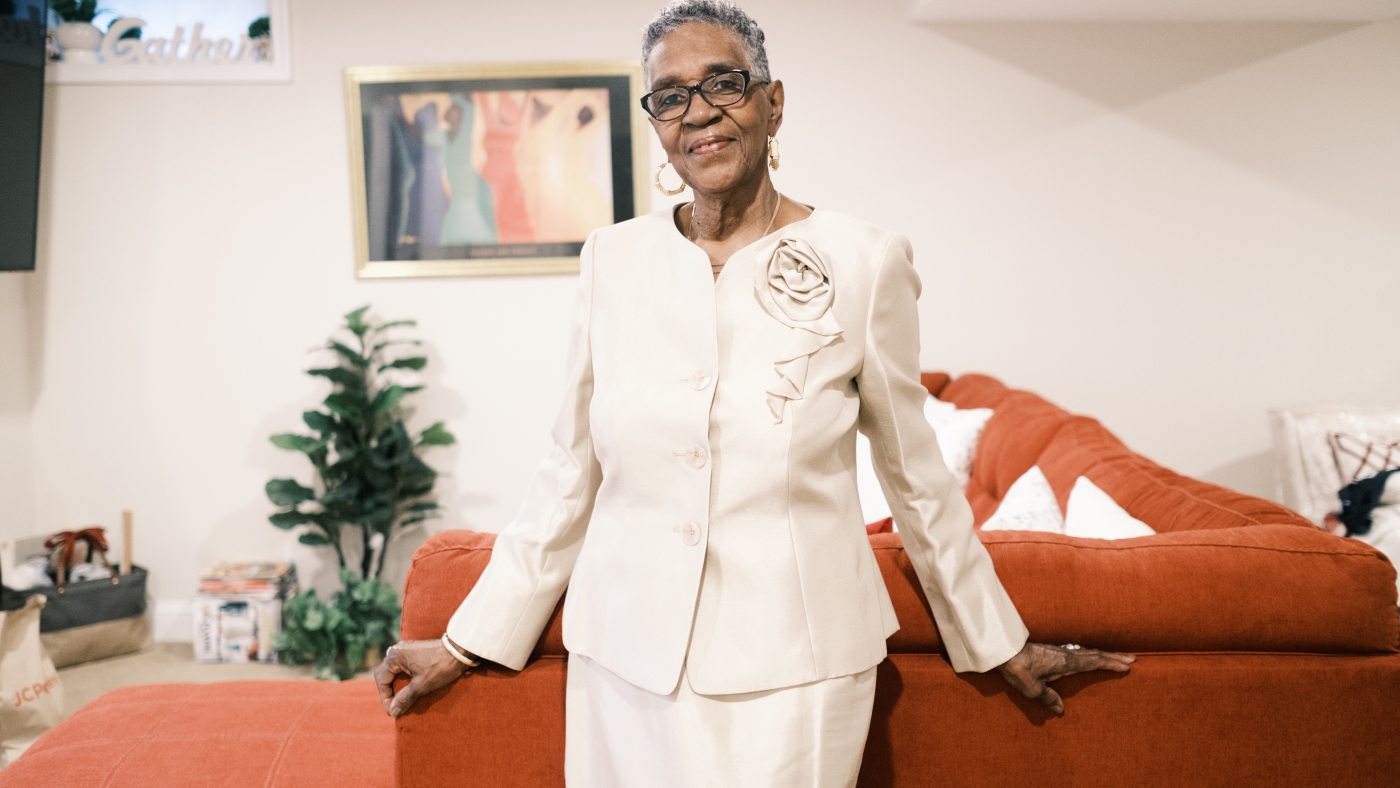Shirley Hopkins helped recruit numerous Black college students in Washington, D.C., for the Nationwide Institutes of Well being’s internship and youth employment packages earlier than retiring to Clinton, Md. Her profession within the federal authorities displays a era of Black employees who discovered stability, objective and alternative in public service.
Kyna Uwaeme for NPR
conceal caption
toggle caption
Kyna Uwaeme for NPR
Shirley Hopkins constructed careers for herself and numerous different Black employees by means of a federal authorities job.
Whereas working within the Nationwide Institutes of Well being’s human assets workplace, she turned often called the “recruitment girl.” It wasn’t spelled out in her job description, however she made it her private mission to encourage extra Black college students within the Washington, D.C., space to use for the federal company’s internship and youth employment packages.
“After I was younger, I used to be not capable of finding employment,” Hopkins says. “I used to be not going to have it the best way it was once I was arising. I used to be going to allow them to be part of one thing and allow them to get a job and work and be accountable.”
The 81-year-old retiree, now residing in Prince George’s County, Md., one of many wealthiest majority-Black counties within the nation, remembers how proud her mom was when she secured her first federal job — caring for younger most cancers sufferers in NIH scientific trials as a nurse’s aide.

Hopkins holds a plaque commemorating her service on the NIH.
Kyna Uwaeme for NPR
conceal caption
toggle caption
Kyna Uwaeme for NPR
“She did not say it, nevertheless it was like, ‘You made it. You moved on up,’ ” Hopkins says about her mom, who earned cash doing hairdressing inside her D.C. dwelling and home work at different individuals’s homes. “A number of the individuals she used to work for, they labored for the federal authorities, and he or she knew how essential it was.”
Working for the U.S. authorities additionally got here with the varieties of advantages and job stability which have attracted many Black federal workers for generations.
Now, the Trump administration’s slashing of presidency jobs, ongoing hiring freeze and assault on range, fairness and inclusion packages are upending what has been a longstanding path into the center class for a lot of Black employees, together with some Hopkins helped recruit.
The precise numbers and demographics of the employees affected by the continuing federal job cuts are arduous to come back by. However the authorities’s newest public information from September 2024 exhibits Black individuals make up 18.5% of the federal civilian workforce, whereas their share of the final U.S. inhabitants, in response to the 2020 census, stands at 14.8%. At some companies, together with the Departments of Schooling, Treasury and Housing and City Growth, Black workers make up a couple of third or extra of the workers.
“You are speaking a couple of disproportionate variety of Black people who find themselves going to be profoundly affected by these broad brush strokes,” says Frederick Gooding Jr., an affiliate historical past professor at Texas Christian College, who wrote American Dream Deferred: Black Federal Employees in Washington, D.C., 1941-1981.
The trail from a post-World Conflict II growth in federal jobs to immediately’s uncertainty
“It’s totally troublesome to inform the story of the Black center class with out the federal authorities’s position in using Black people,” Gooding explains. A significant turning level was World Conflict II, when Gooding says “Black People for the primary time had doorways open to them that basically weren’t open earlier than” below Jim Crow segregation.
“With World Conflict II breaking out and there merely being a provide want for extra our bodies, many Black People took benefit of the meritorious avenues” for employment, Gooding says. “The federal authorities in some ways turned a frontrunner modeling for the non-public sector what a real, equitable setting would appear to be. It did not matter what you regarded like. It mattered how briskly you can kind, you then would get the job.”

Calvin Stevens, who labored on the Common Companies Administration for greater than 30 years, says, “Federal employment allowed me to maneuver into the center class.”
Eleanor Stevens
conceal caption
toggle caption
Eleanor Stevens
A long time later, the federal job for Calvin Stevens was on the Common Companies Administration, the place he constructed a profession spanning greater than 30 years that started with inspecting furnishings, hand instruments and workplace provides at a GSA warehouse in Atlanta.
“I used to be actually, really blessed,” says the 78-year-old Air Pressure veteran. “Federal employment allowed me to maneuver into the center class. Earlier than this yr, these jobs have been secure so long as you probably did your job and carried out effectively.”
Stevens says that his federal wage and advantages allowed him and his spouse to dwell a snug life and ship their three kids to varsity. “We did not purchase extravagant stuff, however we did take the youngsters on holidays,” provides Stevens, who owns his dwelling in Decatur, Ga.
However essentially the most fulfilling half about civil service for him, he says, is that it allowed him “to achieve again and assist any individual else as a result of I did not have to fret about the place my subsequent greenback was going to come back from as a result of I used to be totally employed.”
David Groves, a retired Equal Employment Alternative officer for the Division of Veterans Affairs, serves because the nationwide president of Blacks In Authorities, an advocacy group created by Black federal workers.
Trek Powell
conceal caption
toggle caption
Trek Powell
Stevens says he took each alternative the company provided to advance his profession, like fellowships paid for by his employer. And it paid off. Stevens was promoted a number of occasions earlier than he retired in 2009 as a GS-14, one of many high ranges of supervisory positions within the federal authorities.
It is one instance of long-term profession progress that some Black employees have discovered within the federal sector. Working for a federal company has provided “clear and structured paths for promotion {and professional} improvement” that may be troublesome to search out at a non-public employer, says David Groves, a retired Equal Employment Alternative officer for the Division of Veterans Affairs, who’s the president of Blacks In Authorities, an advocacy group created by Black federal workers in 1975.
Nonetheless, for Black federal workers, making an attempt to advance by means of the ranks of the civil service is usually a bumpy highway. Stevens says he endured challenges alongside the best way, together with “prejudice and biases.”
As Trump officers proceed their push at federal companies to dismantle DEI packages, which the administration has known as “unlawful” and “immoral,” Gooding is anxious Black employees who stay within the federal authorities might be left in a “very weak place.”
“If there’s one employer in our nation that ought to really feel obligated to uphold these concepts of reality, justice, fairness and alternative, it could be the federal authorities,” Gooding provides. “It actually simply opens up the door for the non-public sector to not adhere to the legal guidelines that we have agreed to within the first place.”
Federal job cuts carry shifting winds for Black households and communities

Kevin Abernathy joined the U.S. Postal Service as a letter provider in 1994. “I went there due to the steadiness, and that is why I am nonetheless right here,” he says.
Kyna Uwaeme for NPR
conceal caption
toggle caption
Kyna Uwaeme for NPR
Till not too long ago, the instability of many federal jobs immediately would have been unthinkable for Kevin Abernathy, a nephew of Hopkins, the retired NIH staffer, who was pushed by his aunt to use for his first summer season job with the federal authorities as a young person.
For years, Abernathy’s profession recommendation to his personal 4 kids was constant: When you do not make thousands and thousands of {dollars} catching a soccer or capturing a basketball, then the federal government is the place you wish to be.
Again in 1994, months after the start of his first son, Abernathy deserted his desires of turning into a comedic actor to start out work as a letter provider with the U.S. Postal Service.
“I went there due to the steadiness, and that is why I am nonetheless right here,” says Abernathy, who now delivers on what he calls a “retirement route” in Potomac, Md., and serves as a union steward for the Nationwide Affiliation of Letter Carriers Department 3825.

Abernathy checks a cluster mailbox in Potomac, Md., the place he’s assigned to what he calls a “retirement route.”
Kyna Uwaeme for NPR
conceal caption
toggle caption
Kyna Uwaeme for NPR
To seek out his personal stability, Abernathy’s eldest son, nonetheless, not too long ago took a flip towards a distinct profession path. Now an grownup together with his personal child, and dealing with Trump’s calls to shrink the federal workforce, he determined in January to go away a authorities job to hitch the non-public sector. “Issues are somewhat shaky. We do not know what is going on to be taking place,” Abernathy says.
With extra firings anticipated at many federal companies within the weeks forward, federal jobs might begin to look much less enticing to extra Black employees. And that would find yourself hurting their possibilities of securing positions within the non-public sector in the long term, says Marcus Casey, an affiliate economics professor, who researches social mobility on the College of Illinois Chicago.
“Plenty of college-educated, Black, white-collar employees typically undergo the federal service first to achieve expertise, expertise that they’ll add to their resume and take to the non-public sector,” Casey explains. “If that will get shut off, that may result in a lower within the pathways to the non-public sector. Any time you are shutting off a possible pathway, particularly for a gaggle that is traditionally had extra difficulties in shifting immediately into the non-public sector, that stands to be essential.”

Abernathy kinds by means of letters and magazines on his supply route. The Trump administration’s slashing of the U.S. authorities has helped push his eldest son to go away a federal job to hitch the non-public sector.
Kyna Uwaeme for NPR
conceal caption
toggle caption
Kyna Uwaeme for NPR
Different ripple results of the federal job cuts might seem within the D.C. suburbs in Maryland that U.S. authorities work has helped flip into the nation’s two wealthiest majority-Black counties, says Kris Marsh, a sociologist and demographer on the College of Maryland and writer of The Love Jones Cohort: Single and Residing Alone within the Black Center Class.
“The Black households in Prince George’s County and Charles County will look very completely different. I do not wish to be all doom and gloom, nevertheless it’s in all probability not going to look as spectacular because it seems to be now, if that is the phrase we wish to use,” Marsh says. “There’s loads of analysis that talks in regards to the fragility of the Black center class, how the Black center class in some methods may be one or two paychecks away from poverty, not as a result of they do not save, however due to structural forces.”
Trump officers’ shrinking of the federal workforce has left Marsh questioning how conscious the administration is that it’s prone to shrink the Black center class residing in and across the nation’s capital. “Is that by design or is that identical to a happenstance of what is taking place proper now?” Marsh asks.
The White Home’s press workplace didn’t reply to NPR’s request for remark.


For a Black worker positioned on administrative depart and ready for a possible firing on the Division of Well being and Human Companies, one other query is, what else can this administration do to slash the federal authorities?
“It looks like my entire world is simply knocked off its axis by no fault of mine,” says the HHS staffer, who NPR has agreed to not title as a result of she fears retaliation at work.
Apprehensive about how she would make her mortgage and automobile funds with out federal employment going ahead, the first-generation school graduate says that, “as a Black girl in America, the ‘American dream’ at all times felt like a facade, simply understanding how America has traditionally perceived Black and brown individuals, individuals who aren’t white and on the highest of the meals chain.”
However with a HHS job that allowed her to make a six-figure wage and ship her baby to personal college, she says it began to really feel like she was residing an American dream.
“And now it feels prefer it’s being taken away,” she provides.
Have info you wish to share about modifications within the federal authorities? Attain out to Hansi Lo Wang (hansi.01) or Marisa Peñaloza (marisa.85) on the encrypted messaging app Sign. Please use a nonwork machine.






